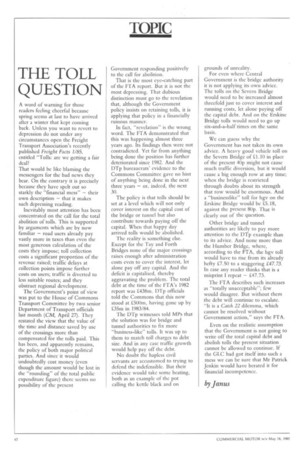TOPIC THE TOLL QUESTION
Page 44

If you've noticed an error in this article please click here to report it so we can fix it.
A word of warning for those readers feeling cheerful because spring seems at last to have arrived after a winter that kept coming back. Unless you want to revert to depression do not under any circumstances open the Freight Transport Association's recently published Freight Facts 1/85, entitled "Tolls: are we getting a fair deal?
That would be like blaming the messengers for the bad news they bear. On the contrary it is precisely because they have spelt out so starkly the "financial mess" — their own description — that it makes such depressing reading.
Inevitably most attention has been concentrated on the call for the total abolition of tolls. This is supported by arguments which are by now familiar — road users already pay vastly more in taxes than even the most generous calculation of the costs they impose; toll collection costs a significant proportion of the revenue raised; traffic delays at collection points impose further costs on users; traffic is diverted to less suitable routes; and they obstruct regional development.
The Government's point of view was put to the House of Commons Transport Committee by two senior Department of Transport officials last month (CM, April 27). They restated the view that the value of the time and distance saved by use of the crossings more than compensated for the tolls paid. This has been, and apparently remains, the policy of both major political parties. And since it would undoubtedly cost money (even though the amount would be lost in the "rounding" of the total public expenditure figure) there seems no possibility of the present Government responding positively to the call for abolition.
That is the mast eye-catching part of the FTA report. But it is not the most depressing. That dubious distinction must go to the revelation that, although the Government policy insists on retaining tolls, it is applying that policy in a financially ruinous manner.
In fact, "revelation" is the wrong word. The FTA demonstrated that this was happening almost three years ago. Its findings then were not contradicted. Yet far from anything being done the position has further deteriorated since 1982. And the DTp bureaucrats' evidence to the Commons Committee gave no hint of anything being done in the next three years — or, indeed, the next 30.
The policy is that tolls should be set at a level which will not only cover interest on the capital cost of the bridge or tunnel but also contribute towards paying off the capital. When that happy day arrived tolls would be abolished.
The reality is something else. Except for the Tay and Forth Bridges none of the major crossings raises enough after administration costs even to cover the interest, let alone pay off any capital. And the deficit is capitalised, thereby aggravating the problem. The total debt at the time of the FTA's 1982 report was £438m. DTp officials told the Commons that this now stood at £500m, having gone up by £35m in 1983/84.
The DTp witnesses told MPs that the solution was for bridge and tunnel authorities to fix more "business-like" tolls. It was up to them to match toll charges to debt size. And in any case traffic growth would help pay off the debt.
No doubt the hapless civil servants are accustomed to trying to defend the indefensible. But their evidence would take some beating, both as an example of the pot calling the kettle black and on grounds of unreality.
For even where Central Government is the bridge authority it is not applying its own advice. The tolls on the Severn Bridge would need to be increased almost threefold just to cover interest and running costs, let alone paying off the capital debt. And on the Erskinc Bridge tolls would need to go up six-and-a-half times on the same basis.
We can guess why the Government has not taken its own advice. A heavy good vehicle toll on the Severn Bridge of £1.10 in place of the present 40p might not cause much traffic diversion, but it would cause a big enough row at any time; when the bridge is restricted through doubts about its strength that row would be enormous. And a "businesslike" toll for hgv on the Erskine Bridge would be £5.18, against the present 80p. 'That is clearly out of the question.
Other bridge and tunnel authorities arc likely to pay more attention to the DTp example than to its advice. And none more than the Humber Bridge, where, according to the FTA, the hgv toll would have to rise from its already hefty £7.50 to a staggering £47.73. In case any reader thinks that is a misprint I repeat — £4733.
The FTA describes such increases as "totally unacceptable"; few would disagree. But without them the debt will continue to escalate. "It is a Catch 22 dilemma, which cannot be resolved without Government action," says the FTA.
Even on the realistic assumption that the Government is not going to write off the total capital debt and abolish tolls the present situation cannot be allowed to .continue. If the GLC had got itself into such a mess we can be sure that Mr Patrick Jcnkin would have berated it for financial incompetence.
by Janus




















































































